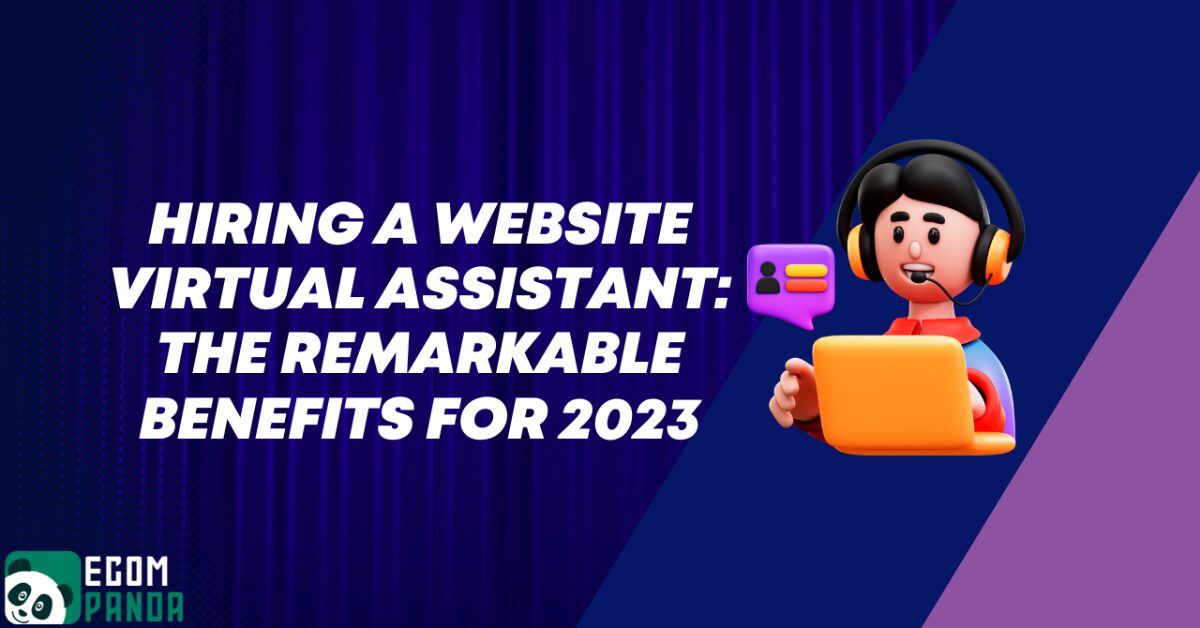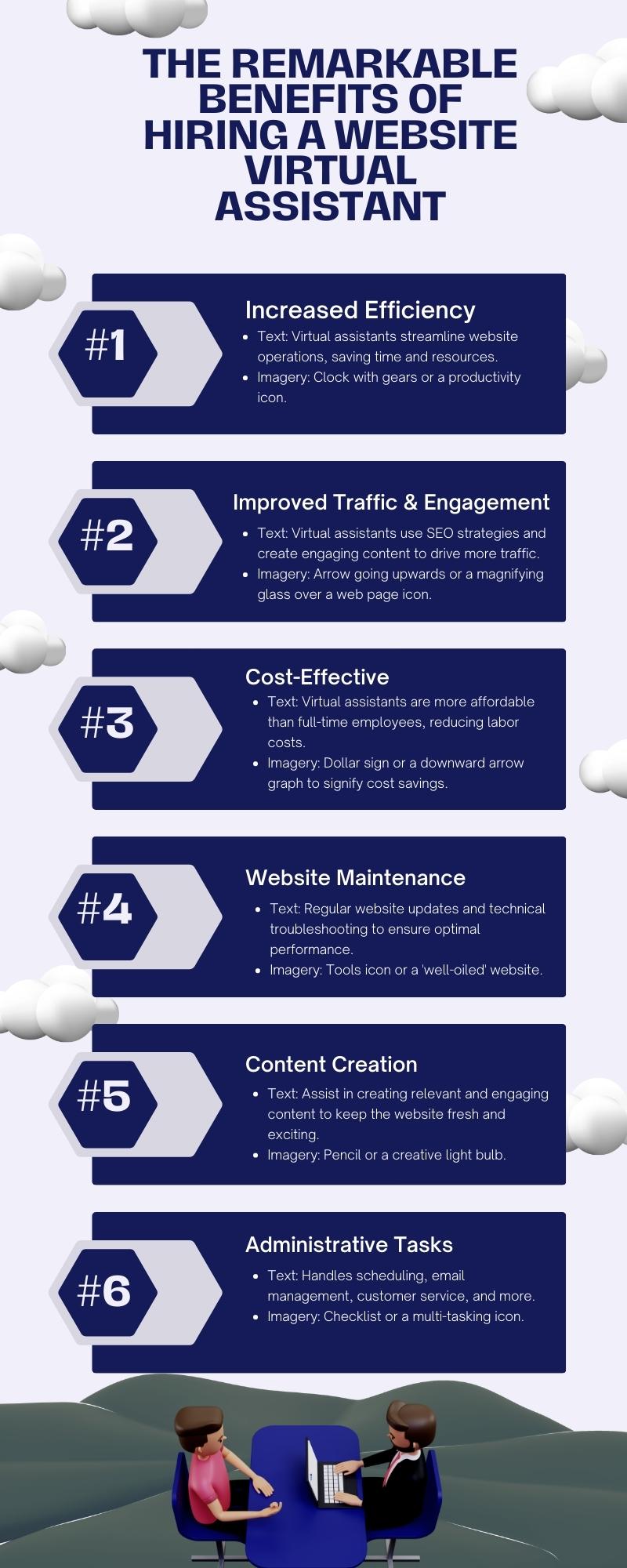Introduction
In today’s fast-paced, digitally dominated world, efficiency and productivity are paramount for businesses aiming to remain competitive. A trend that has seen a significant rise in popularity in response to these needs is the concept of virtual assistant jobs. A virtual assistant, or VA, is a professional who provides a range of administrative, technical, or creative services to businesses remotely. From managing emails and appointments to carrying out marketing and customer service tasks, these professionals have become indispensable assets to many organizations, particularly in the era of remote work and digital entrepreneurship.
For website owners and digital businesses, the role of a virtual assistant transcends traditional borders and offers a plethora of benefits. Hiring a website virtual assistant – a VA who specializes in website management, content updates, SEO, and even social media – can be a game-changer. This professional doesn’t just keep your website running smoothly; they can also help to improve your online presence, increase user engagement, and ultimately drive more traffic to your site.
In the upcoming sections, we’ll delve deeper into these benefits, and explore how hiring a website virtual assistant can be a strategic decision for boosting your business’s digital footprint and overall success.
Table of Contents

The Role and Importance of a Website Virtual Assistant
A website virtual assistant can be regarded as a swiss army knife of website management. They offer a diverse set of skills and capabilities that help ensure your website functions optimally and continually evolves to meet the needs of your audience.
At the core of their work, a website virtual assistant is responsible for maintaining your website. This entails regularly updating content, ensuring the site’s design remains engaging and user-friendly, and addressing any technical issues that may arise. They may also manage SEO, helping to optimize your website’s visibility in search engine results, which can lead to increased traffic and growth for your business.
In addition to these core tasks, a website virtual assistant can also perform a range of other roles depending on your specific needs. They might manage your site’s blog, curating relevant, high-quality content to engage your audience and strengthen your online brand. They could also handle your site’s analytics, monitoring key metrics to gauge the site’s performance and identify opportunities for improvement.
Moreover, a website virtual assistant can streamline website operations, removing the burden of day-to-day site management from your shoulders. This frees up your time to focus on more strategic aspects of your business. They can handle tasks such as moderating comments, managing your site’s social media presence, and even providing customer service, ensuring visitors have a positive experience when interacting with your business online.
A website virtual assistant also plays a crucial role in enhancing user experience. By continually optimizing site design, loading speeds, and content quality, a website virtual assistant ensures your website remains engaging, accessible, and valuable to users. This not only helps to retain existing users but can also attract new visitors to your site, thereby growing your audience and potentially leading to increased business success.
In essence, a website virtual assistant is more than just a ‘handyman’ for your website – they are a strategic partner, committed to enhancing your site’s performance and supporting the growth of your digital business.

Advantages of Hiring a Virtual Assistant for Your Website
- Hiring a website virtual assistant brings multiple advantages to your business, several of which far surpass those associated with traditional employment or attempting to manage these tasks on your own.
- Firstly, the most apparent benefit is the efficiency that a website virtual assistant brings in managing website operations. With their specialized skills and experience, websiite virtual assistants can quickly and effectively handle tasks ranging from content updates, SEO optimization, to technical troubleshooting. They can ensure that your website remains up-to-date, relevant, and bug-free. As a result, you are free to focus on other critical areas of your business, like strategy development or building customer relationships, while your website virtual assistant takes care of the day-to-day operations of your website.
- Another significant advantage of hiring a website virtual assistant is their potential to improve website traffic and user engagement. With skills in areas like content management, SEO, and social media, a website virtual assistant can employ strategies that increase your website’s visibility, draw more visitors, and boost engagement levels. For instance, by regularly publishing engaging content, optimizing keywords, or managing your social media platforms, a virtual assistant can help grow your online presence and keep your audience coming back for more.
- Lastly, hiring a virtual assistant is often more cost-effective than employing a full-time, in-house employee. With a virtual assistant, you pay only for the hours or tasks that you need, and you can scale these up or down depending on your business’s needs. Moreover, since virtual assistants work remotely, you save on overhead costs like office space or equipment. You also avoid additional employment costs like health insurance, taxes, or benefits typically associated with full-time employees.
In conclusion, the benefits of hiring a virtual assistant for your website are considerable. From increased operational efficiency and improved online presence to significant cost savings, a virtual assistant can offer exceptional value and be a critical factor in your business’s digital success.
How to Find the Right Virtual Assistant for Your Website
Finding the right virtual assistant for your website may seem like a daunting task, but by exploring various platforms and utilizing the services of a virtual assistant , you can streamline the process significantly.
Numerous online platforms exist where you can connect with professionals offering services for virtual assistant. Websites like Upwork, Freelancer, and Fiverr allow you to post a job description, receive bids from virtual assistants worldwide, review their portfolios, and choose the one that fits your needs best. Social media platforms, particularly LinkedIn, are also great places to find and connect with professional virtual assistants.
While these platforms can provide a good starting point, using agency for virtual assistant can offer additional benefits. These agencies typically have a rigorous screening process in place to ensure they offer only the most qualified professionals. They can match you with a virtual assistant who not only has the skills you need but also fits well with your company culture and business objectives.
When selecting agency, consider factors such as their reputation, the training they provide to their virtual assistants, the variety of services they offer, and their pricing structure. An agency’s client testimonials and reviews can also provide valuable insights into their quality of service.
Using a agency for virtual assistant can save you time and effort compared to searching for a virtual assistant on your own. They handle the recruitment and hiring process, so you don’t have to sift through countless profiles or conduct numerous interviews. Additionally, agencies often provide ongoing support and training to their virtual assistants, ensuring they stay up-to-date with the latest tools and best practices.
In conclusion, finding the right virtual assistant for your website requires some research and consideration, but the benefits of hiring the right person are well worth the effort. Whether you choose to find a virtual assistant independently or use an agency, the key is to clearly understand your needs and select a professional who can effectively support your website operations and help drive your business success.
The Best Website Builders for Virtual Assistants
Selecting the right website builder can have a significant impact on a virtual assistant’s efficiency and effectiveness. These tools can simplify many tasks associated with managing a website, from designing the layout and creating content to integrating plugins and optimizing SEO.
When evaluating website builders, two critical factors to consider are features and ease of use. Some of the best website builders that excel in these areas include WordPress, Wix, and Squarespace.
WordPress:

As the most popular website builder worldwide, WordPress offers an extensive range of features and flexibility. With thousands of themes and plugins available, it allows virtual assistants to customize websites to their exact specifications. Moreover, its built-in blog functionality and robust SEO capabilities make it an excellent choice for content-driven sites.
Wix:

Known for its intuitive drag-and-drop editor, Wix makes it easy for virtual assistants to design and manage a website, even without coding skills. It also offers a wide range of templates, inbuilt SEO tools, and integrations with various apps and services, enhancing its functionality.
Squarespace:

Squarespace stands out for its sleek, professional design templates, making it ideal for businesses seeking a high-quality aesthetic. While it may not offer as many features as WordPress, its user-friendly interface, excellent customer support, and built-in SEO features still make it a solid choice.
Using the right website builder can significantly increase a virtual assistant’s efficiency. These tools can automate or simplify many tasks, freeing up the virtual assistant’s time to focus on more strategic initiatives like content creation, SEO optimization, and user engagement strategies. Furthermore, with the right website builder, a virtual assistant can more easily adapt the website to changing needs or trends, ensuring it remains current and engaging for visitors.
Shopify:

If you’re managing an e-commerce site, Shopify might be your best bet. This platform is designed specifically for online stores and includes features like inventory management, secure payment gateways, and a user-friendly interface for building product pages. It also integrates with various sales channels, such as social media platforms, allowing virtual assistants to manage all online sales from one place.
In conclusion, investing in a high-quality website builder is essential for virtual assistants. These tools not only simplify website management but also enable virtual assistants to deliver better results and add more value to their role.
An Overview of Virtual Assistant Services
Virtual assistants offer a diverse range of services that can cater to virtually any business need. These services can be broadly categorized into administrative, technical, and creative tasks, each with its unique applications and benefits.
Administrative Services: These include tasks like email management, scheduling, data entry, and customer service. By taking care of these day-to-day operations, a virtual assistant can free up your time to focus on more strategic aspects of your business.
Technical Services: These involve tasks related to website management, such as website design and maintenance, SEO, analytics monitoring, and troubleshooting. A virtual assistant with technical skills can ensure your website runs smoothly, remains secure, and achieves a high ranking in search engine results.
Creative Services: Virtual assistants can also handle creative tasks such as content creation, social media management, graphic design, and video editing. These services can significantly enhance the visual appeal and user engagement of your website.
Choosing the right services for your needs can drastically improve your website’s performance and growth. For instance, if your website’s design is outdated, a virtual assistant skilled in website design can revamp it to make it more engaging and user-friendly. If your website isn’t attracting as much traffic as you’d like, a virtual assistant specialized in SEO can optimize your site to increase its visibility in search engine results.
Furthermore, many virtual assistants offer tailored packages of services that can be customized to your specific needs. This flexibility allows you to get exactly the services you need without paying for those you don’t, ensuring you get the best value for your investment.
In conclusion, the array of services that virtual assistants provide is vast and diverse. By carefully selecting the services that best align with your business goals, you can leverage the skills of a virtual assistant to boost your website’s performance and support your business’s growth.
Conclusion
In the digital age where online presence is paramount, hiring a website virtual assistant can be a strategic decision with numerous benefits. A virtual assistant can bring efficiency to website management, handle various administrative, technical, and creative tasks, and free up your time to focus on strategic business aspects. Their specialized skills can improve website traffic, user engagement, and overall website performance.
Additionally, hiring a virtual assistant is often a cost-effective choice, offering flexibility and savings compared to traditional full-time employment. They can be sourced from a range of platforms or via a virtual assistant agency, ensuring that you find the right fit for your specific business needs.
Equipped with the right tools, like a user-friendly website builder, a virtual assistant can further enhance their productivity and the value they bring to your business. The array of services they offer can be tailored to your specific needs, allowing you to get precisely what you need to boost your online presence.
In conclusion, whether you run a small business, a blog, or a large e-commerce site, a website virtual assistant can be an invaluable asset. By leveraging their services, you can ensure your website not only runs smoothly but also thrives, ultimately supporting your business’s growth in the online realm. It’s time to consider integrating a virtual assistant into your digital strategy and explore the remarkable benefits they can bring.
Frequently Asked Questions
What does a website virtual assistant do?
A website virtual assistant handles the operations and management of a website. They can perform tasks such as updating content, handling technical issues, optimizing the site for search engines, managing the site's blog and social media, and monitoring site analytics.
How do I create a virtual assistant website?
Creating a virtual assistant website involves several steps: choosing a domain name, selecting a reliable web host, building your website with a user-friendly website builder like WordPress, Wix or Squarespace, customizing your website to reflect your brand and services, and optimizing the site for SEO. Additionally, you should regularly update your site with relevant, high-quality content to engage your audience and boost your site's visibility in search engine results.
Is it okay to remove powered by Shopify?
To remove the "Powered by Shopify" tagline, you need to have purchased the theme. You also have to remove it separately for each theme you use. If you're using a free theme, you need to contact Shopify support to get guidance on how to remove the "Powered by Shopify" phrase.
How much do you pay a virtual assistant?
The pay for a virtual assistant can vary widely based on their skills, experience, the complexity of the tasks, and the region they are based in. On average, a virtual assistant can charge anywhere from $15 to $60 per hour. However, many virtual assistants offer package rates for a bundle of services or retainer rates for ongoing work.
What are 4 examples of services for virtual assistant?
Some examples of services include:
- Administrative Services: email management, scheduling, customer service.
- Technical Services: website maintenance, SEO optimization, analytics monitoring.
- Creative Services: content creation, social media management, graphic design.
- Specialist Services: event planning, bookkeeping, marketing strategy development.
Is virtual assistant a skill?
Being a virtual assistant requires a range of skills. These can include technical skills like knowledge of website management and SEO, administrative skills like organization and time management, creative skills like content creation and graphic design, and interpersonal skills like communication and customer service. Virtual assistants also need to be self-motivated, detail-oriented, and able to work independently.







